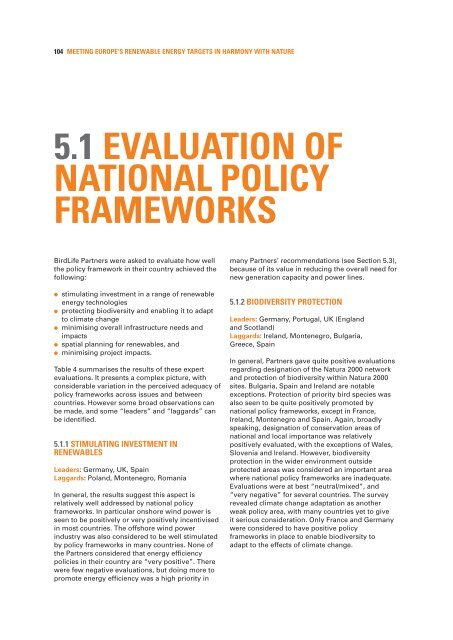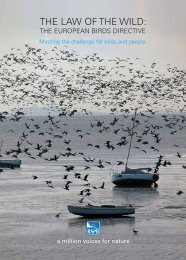Meeting Europe's renewable energy targets in harmony with - RSPB
Meeting Europe's renewable energy targets in harmony with - RSPB
Meeting Europe's renewable energy targets in harmony with - RSPB
You also want an ePaper? Increase the reach of your titles
YUMPU automatically turns print PDFs into web optimized ePapers that Google loves.
104 MEETING EUROPE’S RENEWABLE ENERGY TARGETS IN HARMONY WITH NATURE<br />
5.1 EVALUATION OF<br />
NATIONAL POLICY<br />
FRAMEWORKS<br />
BirdLife Partners were asked to evaluate how well<br />
the policy framework <strong>in</strong> their country achieved the<br />
follow<strong>in</strong>g:<br />
●<br />
●<br />
●<br />
●<br />
●<br />
stimulat<strong>in</strong>g <strong>in</strong>vestment <strong>in</strong> a range of <strong>renewable</strong><br />
<strong>energy</strong> technologies<br />
protect<strong>in</strong>g biodiversity and enabl<strong>in</strong>g it to adapt<br />
to climate change<br />
m<strong>in</strong>imis<strong>in</strong>g overall <strong>in</strong>frastructure needs and<br />
impacts<br />
spatial plann<strong>in</strong>g for <strong>renewable</strong>s, and<br />
m<strong>in</strong>imis<strong>in</strong>g project impacts.<br />
Table 4 summarises the results of these expert<br />
evaluations. It presents a complex picture, <strong>with</strong><br />
considerable variation <strong>in</strong> the perceived adequacy of<br />
policy frameworks across issues and between<br />
countries. However some broad observations can<br />
be made, and some “leaders” and “laggards” can<br />
be identified.<br />
5.1.1 STIMULATING INVESTMENT IN<br />
RENEWABLES<br />
Leaders: Germany, UK, Spa<strong>in</strong><br />
Laggards: Poland, Montenegro, Romania<br />
In general, the results suggest this aspect is<br />
relatively well addressed by national policy<br />
frameworks. In particular onshore w<strong>in</strong>d power is<br />
seen to be positively or very positively <strong>in</strong>centivised<br />
<strong>in</strong> most countries. The offshore w<strong>in</strong>d power<br />
<strong>in</strong>dustry was also considered to be well stimulated<br />
by policy frameworks <strong>in</strong> many countries. None of<br />
the Partners considered that <strong>energy</strong> efficiency<br />
policies <strong>in</strong> their country are “very positive”. There<br />
were few negative evaluations, but do<strong>in</strong>g more to<br />
promote <strong>energy</strong> efficiency was a high priority <strong>in</strong><br />
many Partners’ recommendations (see Section 5.3),<br />
because of its value <strong>in</strong> reduc<strong>in</strong>g the overall need for<br />
new generation capacity and power l<strong>in</strong>es.<br />
5.1.2 BIODIVERSITY PROTECTION<br />
Leaders: Germany, Portugal, UK (England<br />
and Scotland)<br />
Laggards: Ireland, Montenegro, Bulgaria,<br />
Greece, Spa<strong>in</strong><br />
In general, Partners gave quite positive evaluations<br />
regard<strong>in</strong>g designation of the Natura 2000 network<br />
and protection of biodiversity <strong>with</strong><strong>in</strong> Natura 2000<br />
sites. Bulgaria, Spa<strong>in</strong> and Ireland are notable<br />
exceptions. Protection of priority bird species was<br />
also seen to be quite positively promoted by<br />
national policy frameworks, except <strong>in</strong> France,<br />
Ireland, Montenegro and Spa<strong>in</strong>. Aga<strong>in</strong>, broadly<br />
speak<strong>in</strong>g, designation of conservation areas of<br />
national and local importance was relatively<br />
positively evaluated, <strong>with</strong> the exceptions of Wales,<br />
Slovenia and Ireland. However, biodiversity<br />
protection <strong>in</strong> the wider environment outside<br />
protected areas was considered an important area<br />
where national policy frameworks are <strong>in</strong>adequate.<br />
Evaluations were at best “neutral/mixed”, and<br />
“very negative” for several countries. The survey<br />
revealed climate change adaptation as another<br />
weak policy area, <strong>with</strong> many countries yet to give<br />
it serious consideration. Only France and Germany<br />
were considered to have positive policy<br />
frameworks <strong>in</strong> place to enable biodiversity to<br />
adapt to the effects of climate change.
















